The program
The Gerhard R. Andlinger Visiting Fellows program is designed to attract distinguished visitors, who will collaborate with Andlinger Center faculty, researchers, and students, and enrich the research and teaching at the Andlinger Center.
Practitioners from industry, government, and not-for-profit sectors will bring different perspectives and urgency to the energy and environmental challenges that are central to the center’s mission.
Visiting Fellows
Angela M. Fasnacht
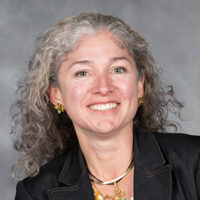 Angela Fasnacht, a veteran of the water utilities sector, joined the Andlinger Center in June 2023 as a Gerhard R. Andlinger Visiting Fellow to develop integrated solutions for decarbonizing the water sector and cleaning up pollutants. Fasnacht has collaborated with Peter Jaffé, the William L. Knapp ’47 Professor of Civil Engineering, to develop a course on decarbonization in the water sector that bridges the gap between researchers, operators, and policymakers. Fasnacht will work with students to construct a global database of policy solutions regarding decarbonization in the water sector to identify which policies have been most effective. Fasnacht will also work with Jaffé to develop a more holistic approach to managing PFAS (per- and polyfluoroalkyl substances), a class of pollutants that are notoriously difficult to remove from soil and groundwater sources. They plan to organize a PFAS summit at Princeton to identify research priorities after recent action from the U.S. Environmental Protection Agency to address PFAS contamination.
Angela Fasnacht, a veteran of the water utilities sector, joined the Andlinger Center in June 2023 as a Gerhard R. Andlinger Visiting Fellow to develop integrated solutions for decarbonizing the water sector and cleaning up pollutants. Fasnacht has collaborated with Peter Jaffé, the William L. Knapp ’47 Professor of Civil Engineering, to develop a course on decarbonization in the water sector that bridges the gap between researchers, operators, and policymakers. Fasnacht will work with students to construct a global database of policy solutions regarding decarbonization in the water sector to identify which policies have been most effective. Fasnacht will also work with Jaffé to develop a more holistic approach to managing PFAS (per- and polyfluoroalkyl substances), a class of pollutants that are notoriously difficult to remove from soil and groundwater sources. They plan to organize a PFAS summit at Princeton to identify research priorities after recent action from the U.S. Environmental Protection Agency to address PFAS contamination.
Ange Nzihou
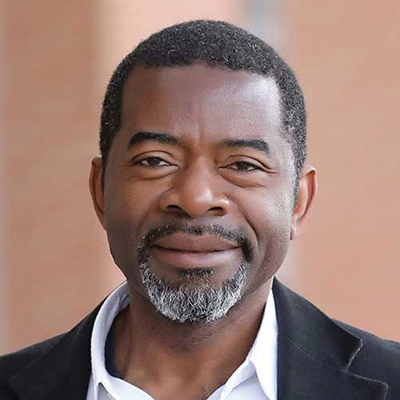
A pioneer in waste and biomass valorization, Ange Nzihou will join the Andlinger Center in March 2024 as a Gerhard R. Andlinger Visiting Fellow. Nzihou is a distinguished professor of chemical engineering at IMT Mines Albi – CNRS in France. As a fellow, Nzihou will continue a collaboration with Claire White, associate professor of civil and environmental engineering and the Andlinger Center for Energy and the Environment, that began when he visited Princeton in 2022 through the Fulbright Visiting Scholar Program. The initial collaboration revealed the mechanism by which iron acts as a catalyst to turn waste biomass such as wood chips and cellulosic biomass into graphene, an advanced carbon material with many potential energy and environmental applications. The collaboration will also grow to include additional Princeton faculty, such as Craig Arnold, to explore additional applications for waste valorization in the agriculture sector.
Non-resident Fellows
Doug Arent
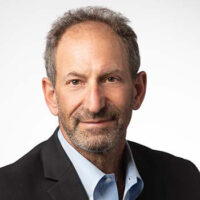
Douglas Arent (Ph.D., 1987) joined the Andlinger Center in May 2022 as a non-resident fellow. Arent is an Executive Leadership Team Member and Executive Director of Strategic Public Private Partnerships at the Department of Energy’s National Renewable Energy Laboratory (NREL), where he focuses on strategic public and private partnerships to transform global energy economies at speed and scale. Arent brings his extensive research and leadership experience in the energy sector to collaborate with researchers, including Jesse Jenkins, Eric Larson, Chris Greig, and Elke Weber, on developing a strategic roadmap for future growth of energy systems and energy transitions research at Princeton. His fellowship plans also include collaborative research on international Net Zero efforts, with attention to fostering connections between NREL and Princeton that leverage their unique institutional strengths and can ground long-term working relationships.
Katya Gratcheva
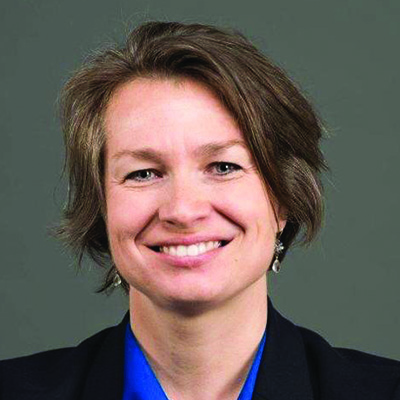
Ekaterina (Katya) Gratcheva joined the Andlinger Center in Fall 2023 as a non-resident fellow. She will work with Chris Greig to expand Rapid Switch, an international research initiative to identify and overcome the most critical bottlenecks to global decarbonization efforts. Gratcheva’s expertise in sustainable and development finance will extend the initiative’s country coverage to include mobilizing capital to help drive resilient, low-carbon infrastructure deployment in developing countries. As a non-resident fellow, she aims to build lasting partnerships between Princeton researchers, the financial industry, and multilateral and regional development banks to accelerate a just energy transition.
Tom Leyden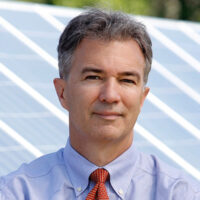
Tom Leyden brings over three decades of experience in leadership roles at a number of solar energy companies that span residential, commercial, and community solar development. During his non-resident fellowship, Leyden will organize events to help students learn about and prepare for careers in clean energy. As the founder and manager of the LinkedIn group Princeton in Solar & Cleantech, he will foster connections between alumni working in clean energy and students interested in entering the field. In addition to the Andlinger Center, he intends to work closely with the Keller Center to teach students about pathways to entrepreneurship in clean energy.
Richard H. Moss
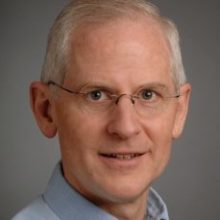
Richard H. Moss is a senior scientist at Pacific Northwest National Laboratory’s Joint Global Change Research Institute at the University of Maryland. He’s also founding director of the Science for Climate Action Network (SCAN), a new collaboration designed to accelerate climate adaptation and mitigation with science and stakeholder engagement. SCAN will assess and improve methods for using the current state of knowledge of climate change and solutions to inform infrastructure design, architecture, standard setting, financing, and other practical aspects of taking climate action at state and municipal levels. While at the Andlinger Center, Moss focused on coastal adaptation, among other topics. Moss has published widely on climate scenarios, uncertainty characterization, and adaptation. He has held several public service positions including with the United States Global Change Research Program and the Intergovernmental Panel on Climate Change (IPCC). He has served on a number of National Academy activities and chaired a federal advisory committee on the National Climate Assessment. Moss holds a bachelor’s degree from Carleton College, Northfield, MN, and holds a Ph.D. from the Woodrow Wilson School of Public and International Affairs at Princeton University.
Moss directed the programming behind the 2020 E-ffiliates retreat, which focused on resilience and making infrastructure and communities resilient to storms and other extreme disruptions.
John Pickering
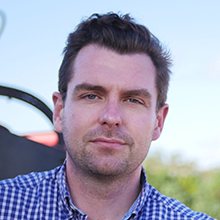
John Pickering, chief behavioral scientist, is the founder and chief executive officer of Evidn, LLC with extensive experience in the analysis, design, delivery and evaluation of behavior change programs for large scale complex problems. Pickering is the co-chair of the Nature Sustainability Expert Panel on Behavioral Science, Design and Sustainability, a member of the Organization for Economic Co-operation and Development (OECD) expert steering group on agri-environmental behavior economics, and was recently appointed to the Queensland Government’s Health and Wellbeing Advisory Board to oversee the development of behavioral change strategies for improving health outcomes across the state. Pickering has various scholarly positions at universities worldwide including an appointment at Princeton University (non-resident fellow), Darden Business School, University of Virginia (visiting scholar), and The University of Queensland (industry fellow). Pickering has published extensively in the areas of behavior change, psychology, sustainability and innovation, and is a regular commentator in state and national media outlets.
Harry A. Warren
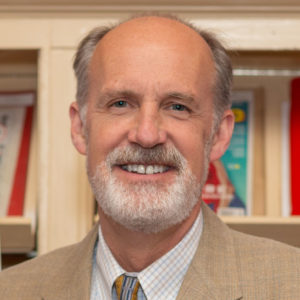
Harry A. Warren, Jr. is president of CleanGrid Advisors LLC, a renewable energy consulting firm focused on Mid-Atlantic markets. Warren is also a co-founder of the Center for Renewables Integration, a non-profit working to advance the deep penetration of renewable energy on the grid.
Warren was formerly executive vice president of Community Energy, Inc. where he was responsible for business planning on community solar, virtual net metering, and other retail customer access programs. Prior to joining Community Energy, Warren spent 17 years as president of Washington Gas Energy Services, Inc., a leading retail electricity and natural gas marketer in the mid-Atlantic region, and served in several positions at WGES’ utility affiliate, Washington Gas prior. Warren negotiated the corporation’s first solar PPAs in 2008 and 2009. Prior to joining Washington Gas, he worked in research, development and design of renewable energy systems. At the Andlinger Center, Warren studied how energy resources and building energy systems can be designed and operated to help meet the challenges power grids face from increasing percentages of variable, renewable energy supplies.
He holds a bachelor’s degree in mechanical engineering from Princeton University and a master’s degree in mechanical engineering from Stanford University.
During his time as a visiting fellow, Warren, a 1979 alumnus, curated a full-day conference aimed at facilitating conversation between diverse players within the energy industry, from renewable energy developers to utility regulators, in collaboration with Energy Dialogues LLC.
Former Fellows
Visiting Fellows in the News
- Experts from across sectors convene to discuss PFAS solutions at Andlinger Center summitOver 80 leaders from academia, industry, and the public sector gathered on Princeton’s campus to brainstorm solutions for combating PFAS contamination.
- Gerhard R. Andlinger Visiting Fellow engineers sustainable carbon materials for a greener futureChemical engineer Ange Nzihou has joined the Andlinger Center as a Gerhard R. Andlinger Visiting Fellow to research sustainable carbon materials.
- Tool for tracking climate progress finds fossil fuel producers come up shortA new framework allows stakeholders to track the climate progress of fossil fuel producers against multiple pathways consistent with the aims of the Paris Agreement.
- Gerhard R. Andlinger Visiting Fellow to triangulate water research, policy, and practiceAngela Fasnacht has joined the Andlinger Center as a Gerhard R. Andlinger Visiting Fellow, working to develop integrated solutions for decarbonizing the water sector and cleaning up pollutants.
- Engineers reveal the secrets behind green grapheneAn international collaboration has yielded insight into new ways of sustainably synthesizing graphene and has added new dimensions to the research programs of each collaborator.
- Andlinger Center Speaks: Bridging the gap between climate commitments and clean energy fundingIn this Q&A, experts discuss why the world is falling behind on clean energy investments and the changes needed to get back on track.
- Making the switch to a net-zero mindsetIllustration by Matilda Luk by Denise Valenti, Office of Communications Green technology holds the promise of significantly reducing carbon emissions and helping humanity to avoid the worst impacts of climate change. ...
- Big but affordable effort needed for America to reach net-zero emissions by 2050, Princeton study showsBy Molly A. Seltzer With a massive, nationwide effort the United States could reach net-zero emissions of greenhouse gases by 2050 using existing technology and at costs aligned with historical spending ...
- Comprehensive look at U.S. fuel economy standards shows big savings on fuel and emissionsResearchers cite that CAFE standards saved $5 trillion in fuel costs and prevented 14 billion metric tons of carbon from being released into the atmosphere. (Photos: Adobe) By Molly A. ...
- Tailoring climate science for users is key to coastal adaptation and resilience, say experts at E-ffiliates retreatBy Molly A. Seltzer Making the latest climate science accessible to mayors, planners, and local officials is the only way coasts will be able to prepare for sea level rise and ...